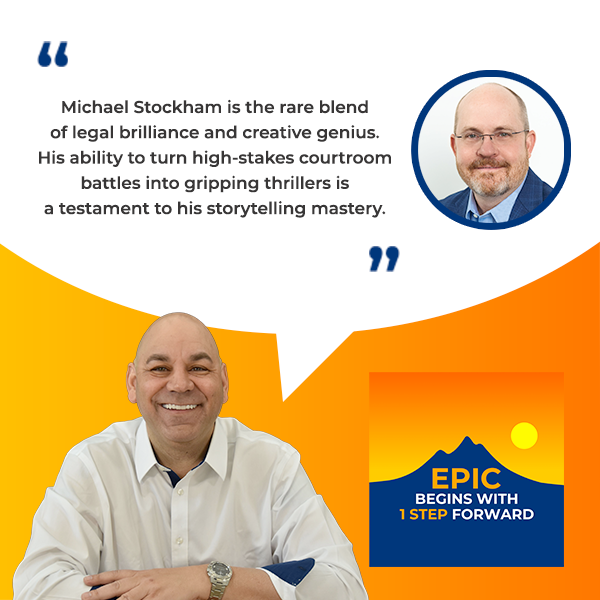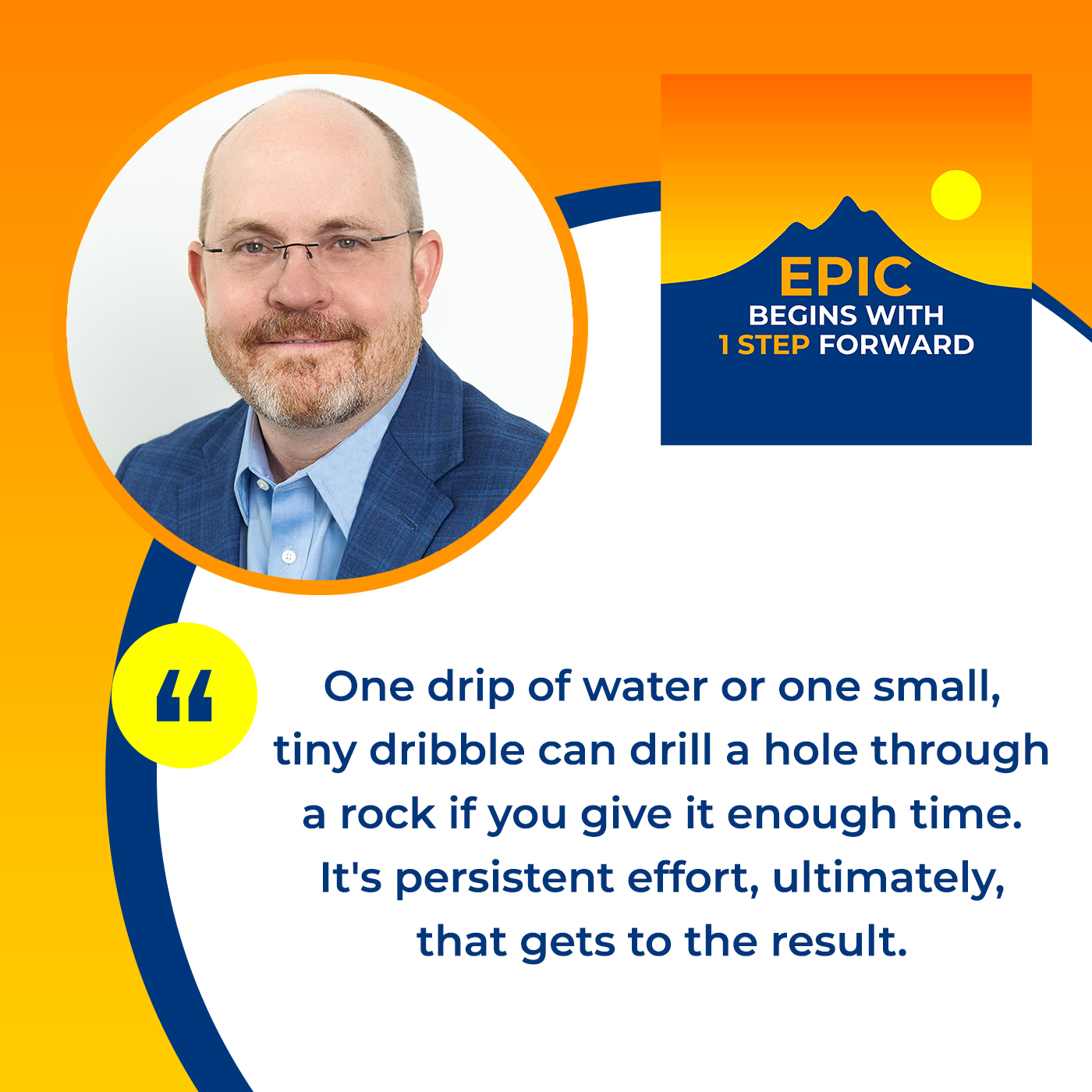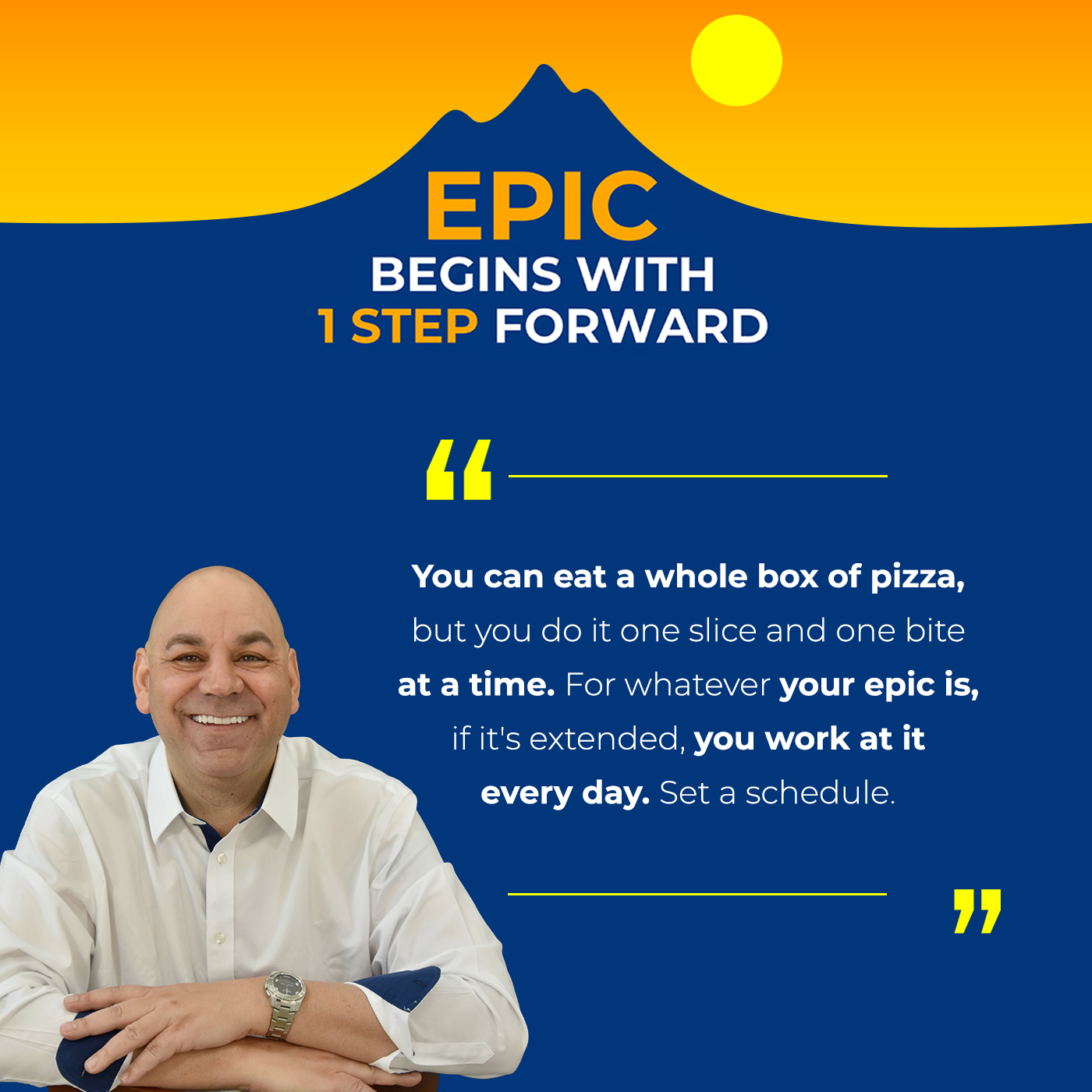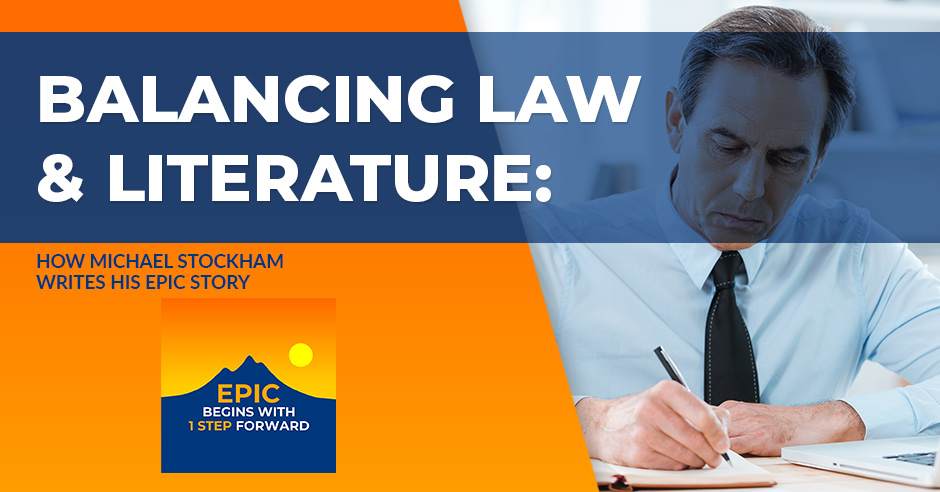Balancing law and creativity—can it be done? Host Zander Sprague sits down with Michael Stockham, a Dallas-based lawyer turned novelist, to discuss his journey from courtroom battles to crafting legal thrillers. Michael shares how a lifelong passion for writing led him to create the Jake Fox series, the challenges of balancing a demanding career with creative pursuits, and the power of persistence in achieving EPIC dreams. If you’ve ever thought about writing a book while juggling a full-time career, this episode is packed with insights, motivation, and practical advice. Tune in for inspiration, writing insights, and the mindset behind taking that first step!
#EPICBeginswith1StepForward #ZanderSprague #BalancingLaw #LegalThrillers #WritingJourney
—
Watch the episode here
Listen to the podcast here
Balancing Law & Literature: How Michael Stockham Writes His EPIC Story
I am so honored to have Michael Stockham join me to talk about his epic journey.

Michael, tell everyone who you are and what you do.
Introducing Michael Stockham And His Diverse Career
I’m a partner in a large law firm in Dallas, Texas. I spend most of my days helping companies that have problems with either the government shareholders or auditors, etc. I do internal investigations on whistleblower claims, securities, class actions, and proxy fights. I represent folks in front of the SEC and the DOJ. That’s my general day-to-day bread and butter time spent.
You also do something else, don’t you?
Around the COVID timeframe, I had a severe bout of insomnia and needed something to fill the early morning hours, so I went back to a lifelong dream of writing a novel and started on that process. I have been successful in getting two novels out. My second novel was released in December 2024, and I’ve been very excited to see that progress. The novels have been somewhat successful. I’m proud of them, and I’m excited that I got to do something I’ve always wanted to do.
That’s awesome. Congratulations. The books are great. I’ll have you talk about them in a second.
No problem.
This lifelong dream or this epic dream of, “I’d like to write a book sometime,” I talk about it all the time. Here, I have someone who was like, “Someday, I’d like to write a book,” and he took that first step forward. What was the tipping point for you to sit down and start to write the novel?
It is a lifelong dream. I’m a lawyer by accident, if you will. I was originally supposed to be a poet, so my original degree is in writing poetry from the University of New Mexico. I doubled down on that and got a Master’s degree in writing short fiction from Texas A&M University. In between those 2 degrees, I spent 9 months in the wilderness as a fly fishing guide on a small river in Northern New Mexico. After that, I was all kinds of things like a mason’s apprentice and a dishwasher. I had all kinds of odd jobs. I was a telemarketer for a while and sold supplies and ultimately went back to law school.
Through all of those journeys and all of that time, even being an associate and ultimately a partner in the law firm, the one thing that I kept coming back to almost like a compulsion was writing over and over. I have a couple of other terrible novels in a desk drawer. When COVID came around and I had time to think and extra time on my hands, so to speak, I thought, “I’m not getting any younger.” I was about 50 or 51 at the time and decided it was time to get started on working on it and trying to figure out a way to put together a novel and go forward.
I’ve written three books. I did not, however, have a burning desire to write a book. I know you’ve heard this before. If you asked me in college whether I’d write a book, I’d be like, “Heck no. I hate writing.” I joke that I am a talker, not a typer, and yet somehow, I’ve written three books. Two of them I’m lucky enough to have been Amazon bestsellers. They’re good books. I don’t want to discount my books, but these are things that I never thought would happen in my life. It’s great that you have that passion. Talk a little about that because your idea here is not, “I’m going to write a novel.”
Exploring The Jake Fox Series And Its Development
I wrote my first novel, Confessions of an Accidental Lawyer, and that was a one-time story. It’s based loosely on actual events in my life, etc. After that, I wanted to do a little bit of a different project, free myself up, or dislocate from actual experience, which is quite freeing. If you’re not writing about something that you experienced, then you’re not worried about being truthful. You can be creative.
If you’re not writing about something that you experienced, then you’re not worried about being truthful.
I thought I’d like to write a series, and I didn’t have any idea how many I wanted to write. I started thinking in bits and pieces how I would put it together, and it seemed somewhat fit to do it in threes, to try to set it up as a series of 9 books in 3 trilogies, if you will, where 1 series of events goes over 3 novels and then another series over the next.
It is quite a project. It’s somewhat daunting to know that you’ve written a novel and all the blood, sweat, and tears that goes into that and then realize, “I’m only 12% done.” It’s still exciting to think about moving that forward. One thing I’ve enjoyed is that when you do this, you get to know the characters, so you get to live within that world much longer than one book, and that’s satisfying.
The ideas of developing them. As you’re writing like a human being, you’re like, “I hadn’t thought, but maybe we’ll introduce this and we can call back two novels about this.” I have to imagine that in order to envision a nine-novel arc, that requires a lot of organization and the creation of structure to make sure that you at least have an idea of where you’re going. Am I right?
Yes. There is some serendipitous creativity that leads you in different directions, but overall, especially almost in a science fiction series where you are creating a world, you start to have a superstructure, if you will, to the book of things that become very common. The characters start to live on their own, so they each have their own personalities, which continue.
The organization of it is a constant tension, trying to figure out how to do it better and faster in a more organized manner. You’re learning not only the craft of novel writing but also how to put these larger arcs together. The process for the first book is completely different than the process I used to write the first book, Jake Fox. Confessions of an Accidental Lawyer was differently put together than this one, Ties That Blind. For the second novel that I’m working on, we’re going through the outline process and refining at this point how we do that to make it more efficient and to help keep the structures together, especially since it’s a nine-book project.
This is so that people know. I know on one of them, you’re not using your name. It’s under a pen name. Is that correct?
They’re both under Michael Stockham. In Jake Fox: Ties That Blind, Jake Fox is the main character. He’s a lawyer that returns to a small town in Texas where he grew up, and it goes from there.
I remembered there was a Jake Fox. I’m like, “Okay.” That’s a character. That’s the Jake Fox series.
Correct.
Are these legal thrillers? Is that how you would say they are?
Yeah, that’s the main genre. Legal thriller, domestic thriller, psychological thriller all try to have some sort of legal component to it. There’s not a central trial to each one or a central murder trial. If you think about the full works of John Grisham, all of his books tend to have some sort of intersection to either a legal trial, a legal concept, or a legal problem, or generally the problems that leak into a lawyer’s life but the nexus is the law.
Balancing A Busy Law Career With Novel Writing
One of the things I talk about in EPIC Begins with 1 Step Forward is these two important words of not yet. You’ve got a very long not yet going on because it takes time to write nine novels, especially if you are a partner in a successful law firm, which I have to imagine keeps you busy. For you, that idea of not yet and having to wait to get stuff done, how is that process for you? How is that feeling of, “Not yet. I don’t have the second novel written. I’m working on it.”
You have to balance the anticipation against the overwhelming odds, but it is a large task, and you can couple that accidentally or channel that accidentally into procrastination. Those are probably the biggest moment-busters there are. Sometimes, the tasks seem so large that perhaps you’re not going to work on them. There’s always tomorrow if it’s so big. You have to do it one little step at a time.
There are some things that I try to remember. I’ve heard, “How do you eat an elephant? One bite at a time.” I keep that in mind. Since I spent so much time on rivers, fishing, and other stuff, I’ve always been amazed with how water works. One drip of water or one small, tiny dribble can drill a hole through a rock if you give it enough time. It’s persistent effort, ultimately, that gets to the result.

You try to take it one day at a time. You take it one morning at a time. I tend to be an early riser, so I get up at 4:00 and try to do what I can on the book, the publishing, the processing, and the marketing, and then I take a shower and get into the office at about 8:30. I try to do something every day. I try to be productive every day. Sometimes, I’m not successful, but most days, I am.
That’s true of anything. I certainly know of many of the things I’ve done, it’s an iterative process. When I was training for marathons, some days I had good runs and some days I didn’t have good runs. Some days, it was raining. Some days, it wasn’t. It was more the cumulative effect of writing my books. I didn’t sit down and write everything all at once.
In fact, you talked about how to eat an elephant. I talk about the pizza analogy of when we eat a pizza, we tend to eat it one slice at a time unless there’s an adolescent boy around, in which case you may be eating two at a time. Otherwise, you’re not going to eat, but that’s not the point. We tend to eat pizza. You can eat a whole pizza, but you do it 1 slice at a time and 1 bite at a time. For whatever your epic is, if it’s extended, you, every day, work at it. Set a schedule.

I agree with that.
Structure is so important. You’re right. It’s like, “I’m not feeling creative today. I don’t know.” It’s true. You say, “I’m going to write half a chapter,” or, “Here’s what I’m going to work on today.” Some days, you get on a roll and you may be bummed. You’re like, “I got to stop, but I’m on a roll. I have to travel to get to the office.” I know I had days where I’m staring at the computer. Keep in mind. I was dictating most of my books. Even then, I’m sitting there going, “I don’t know what I want to say on this.” I’m sure you’ve written stuff, and then you go back, read, and go, “That wasn’t good. That’s not how I wanted that to go.”
Revision’s a good part of it. Structure is extremely important, and having a routine to try to do stuff. Systems is another great tool, being able to set up a system on how you do certain tasks each time or try to do them in the same order. Most of my chapters are very short. They’re about 1,250 words, which is something I could rough draft in the morning and then work through with some sort of editing aid, like ProWritingAid or something else at night. That’s one system.
For some chapters in particular, I’ll run across a song that I like and put it on repeat until I’m done with the first draft because there’s a mood or a concept that’s in the music that is working with the chapter. Systems and little tricks can be helpful in breaking down each one of those individual bites towards that bigger overall goal.
If you were to look into the future, what do you want for your Jake Fox series? What would be some of the goals?
Hopes And Goals For The Future Of The Jake Fox Series
One, I’d like it to be well-received, and it is being well-received, so that’s great. That’s one success. Ultimately, I’m not going to be a lawyer forever. Perhaps over time, it can develop into its own series and be an alternative source of income. There’s practicality to it all. My father celebrated his 90th birthday, and his mother passed away at 105. With those genes, there’s a possibility that I will have a lot of time after retirement to figure out what to do. Having a writing career and doing something like this would be enjoyable, exciting, and stimulating. I have something to do in my older years where I’m not sitting around watching Jeopardy, although I do love Jeopardy. There’s that concept.
I am an indie author. We’re learning all of the new and interesting things about how to self-publish and learning about running your own press. There’s a lot of going out and finding cover designers, proofreaders, and people that help and can do the production on the books. There’s a whole, huge learning curve on it, including marketing. Social media, how do you do it? Do you advertise or do you not? How do you build followings? There’s not a morning that goes by that doesn’t start with a learning curve. You have to keep momentum one step at a time.
There’s not a morning that goes by that doesn’t start with a learning curve. You have to keep momentum one step at a time.
One thing that I found was a longer and perhaps more challenging process was the editing process. I know in my first book, I was honestly doing it on my own, but I found a cover designer and layout. Part of what I had with that company was that they had professional proofreads, which is great because I’m not a very good speller. Thank God for autocorrect. They go through, and then you see all their edits when you read your book.
My experience with my books was that when they finally came out, I had read my books completely 6 or 7 times in a month. I love my book, but I don’t want to have to re-read that chapter. I could dictate the chapter because I’ve reread it. Did you find that same experience as you were going? A novel is much bigger. My books are not that long. A novel, by definition, is at least 200 pages.
A reasonably commercial novel is about 70,000 words. Both of my books have come in right around 80,000 to 95,000, so they’re big projects. People are amazed as they’ve watched me go through the process of how much work a book is. It’s an unbelievable task. It is. It is interesting to go through that. When you get to the end of the book and it comes from the press and you see it, there is a desire not to get back into it.
Part of that is trepidation that you’re going to want to edit it again, change something, or find a mistake. There are 90,000 words. You’re an indie publisher there. The chances of there being a mistake are higher than if it comes out of a regular publisher. You worry about that kind of stuff. You try to be forgiving about it. Since I’m doing a nine-book series, I’m going to end up reading the books over quite a bit to maintain consistency, etc.
My point was when Confessions of an Accidental Lawyer came out and you finally got it in your hand and were all excited, did you have the experience of, “I don’t know that I want to go in and read my own book.” I know that sounds terrible but you’re like, “I need a break.” Think about any book. If you’re like, “I’m going to read this book cover to cover six times in a month,” you’ll probably be like, “I’m done with that book for a while.”
There’s also a desire for it to be complete, the desire to be done with a project. Going back into it reignites, “Do I want to change stuff or other things?” You give up a little bit of that feeling of accomplishment and finality when you start interacting with the book again. I get it. It’s a very common feeling. In fact, I heard a quote from John Grisham at one point where they asked him which was his favorite book to read, and he said he didn’t read his own books.
That’s Dame Maggie Smith. She was a wonderful actress. I am so sorry that she’s passed. She has all these iconic roles in Harry Potter and Downton Abbey. I’ve never seen any of them.
I get that. I’ve heard several actors say that, and that’s fairly common for creatives in general. They’re pleased with the work and happy other people are pleased and entertained by it, but I don’t know how often they interact with their stuff after the final clip or the final publishing is done.
The Concept Of “Good Enough” And Accepting Imperfections
With my book, I needed about a month of not going. You’re right. One of the things that was hard in talking and doing coaching with some people who were authors and stuff was that concept of good enough. We don’t want mistakes, but there has to be a point where you’re like, “I’m done. It is what it is if I’ve missed a period or comma.”
You have to imagine that if you and multiple other people, some of whose job is proofreading, if you’ve all missed something, what can you do? It stinks when you go back and then you’re like, “How did we mess this up?” Some of that’s a psychological thing of when you read something, maybe you missed a the or an a, but because of the material and what it’s supposed to say, your brain skips over the fact that the isn’t there.
100%, even in my professional life.
As a lawyer, you guys are writing these long briefs. You are trying to get them as correct as possible. Mistakes happen. You may miss something.
That’s true, and that’s another thing when you talk about momentum in what you deem an epic journey. It is one step at a time. There is a little bit of being gentle with yourself or forgiving. Especially if you’re learning something new for the first time, there are going to be mistakes. You’re going to make errors. Things are not going to go as well as you want in some places.
You have to pick yourself back up, believe in the project, and keep moving forward, which is very important because there are going to be things that come out of the blue, especially in this day and age of social media and freewheeling reviews and commentary on Amazon or on any of the other book sites. You’ve left yourself open to the vast array of different personalities on the internet. Some of those people say things that can be hurtful or bruise your ego. You have to look at the vast majority of the comments or the vast majority of the feedback and believe that something excellent is happening and that you still believe in the project.
You’re right. There are the people whose sole purpose is to try and tear you down for whatever their reason is. I certainly know as I am out there posting stuff on social media, like their videos, sometimes there are trolls who are trolling for a reaction. They’re saying negative things. You say, “Not everyone’s going to like my book. Not everyone’s going to like your book. The people who want to say bad about it, okay.” It’s like any job. Sometimes, someone likes a job you’re doing. Most people do but some people don’t.
You try to learn, one, getting thick skin. As a trial lawyer or even in any legal function, not everything is a victory. Sometimes, you go home on your shield and try to learn the best you can from your losses. In fact, one of my favorite quotes from an old mentor of mine is that the only difference between an old lawyer and a young lawyer is that the old lawyer has been kicked in the teeth enough to know when to duck. It’s a very true statement. You have to learn from losses and mistakes.
The only difference between an old lawyer and a young lawyer is that the old lawyer has been kicked in the teeth enough to know when to duck.
I tell people all the time that failure is part of the journey. You were talking about tools and stuff that you’re using to help you write the book or help craft it better. There are all kinds of fabulous tools out there. As an entrepreneur, I’ve been very generous to buy many tools. Some are not the right tool for me. It’s not that they’re bad. It’s not what’s going to work for me.
The Ongoing Journey Of Learning And Adapting
100%. I agree. Trial and error is a very big part of it.
As a trial attorney, you go out and try something. One jury loves that approach, and another jury, you’re looking and going, “I’m losing the jury on this. They don’t look happy with what I’m saying. What do I have to do? How do I shift it around?”All of this is fascinating. There is so much, and it honestly never ends. The marketing of your book isn’t, “I’m going to go and do a marketing push.”
My EPIC book came out a few years ago, and I am still like, “What am I going to do? Am I going to do a promo?” I don’t know about you, but I get emails on the daily about including it in this newsletter to 85,000 subscribers or whatever. People are willing to take your money to help you.
100$%. You’re right. Navigating through good mentors and bad opportunities is a great thing. That’s a learning exercise in and of itself. That’s a momentous project to undertake.
For you, what is it to be on this epic journey that you dreamed about?
It’s incredibly fulfilling. I love doing it. There are some hard days when you’re like, “Why am I doing this? Why am I trying to do this?” Overall, it’s incredibly satisfying, especially when somebody enjoys one of the books, whether it’s a review or people notice it. One of my favorite stories of all time is when my wife had a copy of my first book, Confessions of an Accidental Lawyer, on a trip with her in Vail, Colorado.
She started this thing on her social media where she takes a picture of the book in any town she travels to to shtick. She had it up on a sidewalk or a bench in downtown Vail in the little square there and was taking the picture of it, and some woman came running from across the square to tell her how much she liked the book and that it was a great book. She was so glad she was reading it and had no idea that my wife was the one that had the book or she knew it or anything. It was this wild out-of-body experience for my wife. I am incredibly grateful that, out of the blue or nowhere, a complete stranger enjoyed the work. Those are very satisfying moments.
I know with my books, there are people who come up and maybe they’ve heard my name or I’m at a conference or something. I love it. It’s great when someone goes, “I read your book. I liked it. It made a difference. I like this. I have a question about that.” I’m always so flattered and thrilled that something I created is helping other people. That’s why I’ve written my books.
That is satisfying.
My first book is about sibling loss, Why Don’t They Cry?. That’s for parents. I get emails from people who say, “That book was helpful.” It’s great. I’ve had people come up to me and go, “It was okay, but I thought you got this wrong,” and I’m like, “Thank you.”
Still, they interacted with it and it made some impression, which is great and satisfying.
How To Find Michael Stockham’s Books And Contact Him
What I say is, “At least they read it.” They didn’t have to like it but at least they read the book. It’s another person in the read-the-book column. How can people find your book? How can they get a hold of you if they have questions or they want to shower you with praise?
The books are both for sale on Amazon, Confessions of an Accidental Lawyer and Jake Fox: Ties That Blind. An easy way to get a hold of me is through JakeFoxThrillers.com. They can also email me at In**@*************am.com if they have any questions. I am happy to answer anybody’s questions.
I want to thank you so much for joining me.
It has been my pleasure. I enjoyed it.
This was truly an epic conversation about book writing and novel writing. I want to remind everyone that if you are ready to begin your epic journey, go to EpicBegins.com. Coming soon is the EPIC Begins with 1 Step Forward TV show. Be on the lookout for it. As always, I want to remind people that if you are ready to begin your epic journey, remember that epic choices lead to the epic life that you want.
Important Links
- Michael Stockham
- Confessions of an Accidental Lawyer
- Jake Fox: Ties That Blind
- EPIC Begins with 1 Step Forward
- Why Don’t They Cry?
- In**@*************am.com
- ProWritingAid
About Michael Stockham
 Michael Stockham is a Dallas-based attorney, author, and storyteller with a passion for legal thrillers. A partner at a major law firm, Michael specializes in high-stakes corporate litigation, including whistleblower claims, securities fraud, and government investigations.
Michael Stockham is a Dallas-based attorney, author, and storyteller with a passion for legal thrillers. A partner at a major law firm, Michael specializes in high-stakes corporate litigation, including whistleblower claims, securities fraud, and government investigations.
Despite his demanding legal career, he pursued his lifelong dream of writing, publishing Confessions of an Accidental Lawyer and launching the Jake Fox thriller series.
Michael seamlessly blends legal expertise with compelling storytelling, crafting gripping narratives that captivate readers. Learn more at JakeFoxThrillers.com.

